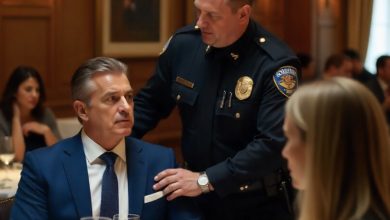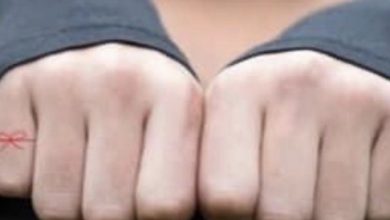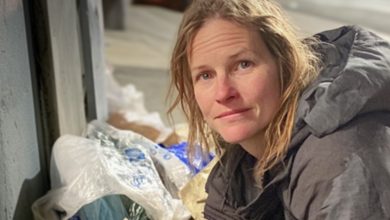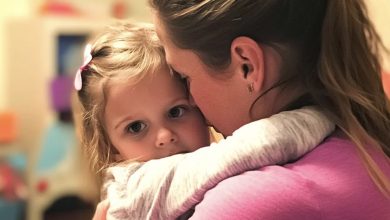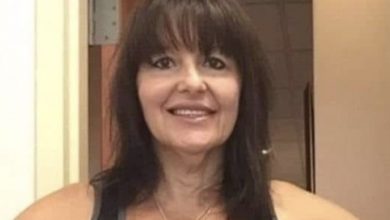I Faked My Death to Escape My Husband’s Abuse — When He Found Me Years Later, He Learned the Truth I’d Been Waiting to Reveal
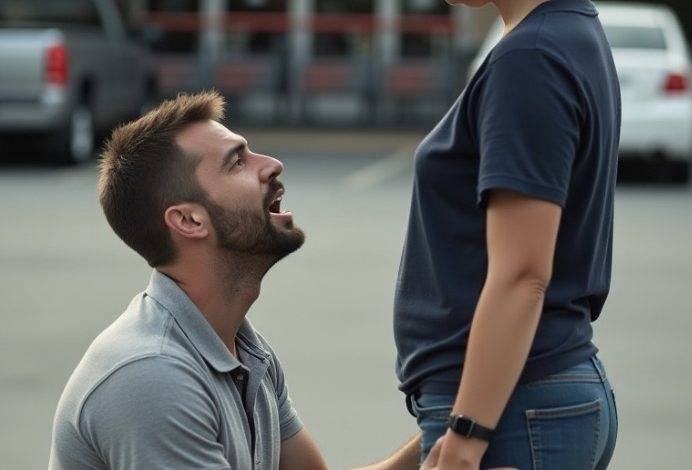
“He Tried to End My Life, So I Faked My Death — Three Years Later, He Found Me.”
My name is Amber, and I’m standing in the parking lot of a grocery store, staring at the man I thought I’d buried in my past forever.
My hands shake so violently that I drop my keys. They clatter against the pavement, the sound slicing through the ordinary noise of shopping carts and car doors.
“Amber,” he says quietly, stepping toward me. “Please… just listen to me.”
My body wants to run, to scream, to vanish—but I can’t move. My feet feel cemented to the ground. My eyes lock on him: Marcus, my husband. Or ex-husband. Or the monster who once promised to love me forever and then tried to kill me.
All I can see is the night he grabbed my arm and pushed me toward the edge of our eighth-floor balcony, whispering, “It’ll all be over soon.”
That was three years ago.
“How did you find me?” I finally whisper.
He takes another step closer. He looks different—older, thinner, maybe even remorseful. “It took me a long time,” he says softly. “But I had to. The kids—”
“Don’t,” I snap, lifting a shaking hand. “Don’t you dare say their names.”
“They miss you,” he continues, his tone almost pleading. “Emma asks about you every night. Tyler drew a picture of you last week. It’s taped above his bed.”
The mention of their names crushes me like a wave. Emma is eight now. Tyler is six. I left when they were five and three. I’ve missed birthdays, school plays, bedtime stories—all the things mothers are supposed to be there for.
But I left because staying meant I’d never see another sunrise.
Let me explain. Because no one just disappears without reason.
Marcus and I met in college. He was charming, magnetic, the kind of man who made people feel lucky just to be near him. He was funny and confident and told me I was special.
We married two years after graduation. At first, it was perfect—dinners with friends, weekend getaways, laughter filling our small apartment. Everyone said we were the dream couple.
Then Emma was born. And something inside Marcus shifted.
He became controlling in quiet, subtle ways. He’d check my phone “just to be sure,” ask who I texted, where I went, why I was late. He told me to quit my job. “You should be home with the baby,” he said. “That’s what good mothers do.”
I believed him. I thought it was love.
Then came the day he told me to close my personal bank account. “Married couples share everything,” he said, smiling.
So, I did.
That was the first mistake.
My best friend Jessica was the first to notice.
“Amber, does Marcus always check your messages like that?” she asked one afternoon.
I forced a laugh. “He’s just protective.”
Jessica frowned. “That’s not protective. That’s control.”
But Marcus didn’t like Jessica. “She’s jealous,” he’d say. “She wants to ruin what we have.”
Slowly, he pushed her—and everyone else—out of my life.
By the time our son Tyler was born, I had no friends left. Just Marcus. Exactly how he wanted it.
At first, the mistreatment was emotional—comments that chipped away at my confidence. Then it turned physical. A grab too hard, a shove during an argument, a slap followed by tears and apologies.
“I didn’t mean to,” he’d whisper, kissing the bruise he left. “You just made me angry. I love you.”
The first time he really hit me was on Tyler’s first birthday. After everyone went home, he cornered me in the kitchen.
“You embarrassed me,” he hissed. “You made me look like a fool.”
He slapped me so hard I saw stars. Then, as I stood there shaking, he murmured, “Look what you made me do.”
That night, I knew I had to get out. But I had two children and no money. Marcus controlled every cent. He even had cameras in the hallway—“for safety,” he said.
Still, I started planning in secret.
I opened a new account and hid small amounts of cash—$20 here, $50 there. I packed a bag with essentials and buried it behind my clothes. I told myself I’d leave once I had enough.
But he found out before I could run.
It was a Friday night. Marcus came home drunk. His eyes were cold, flat.
“I know what you’ve been doing,” he said quietly. “You think I’m stupid?”
He dragged me to the balcony. My heart pounded so loudly it drowned everything else out. “You’re not leaving me,” he snarled. “You’re not taking my kids.”
Then I understood. He was going to kill me and make it look like I’d done it myself. He’d been laying the groundwork for months—telling people I was unstable, that I was depressed. He’d even “confided” to our friends that I’d been acting strangely.
He pushed me toward the edge. The railing pressed into my spine. The parking lot below blurred into darkness.
“Marcus, please,” I begged. “Think about the kids.”
He smirked. “I am thinking about them.”
And then—by some miracle—I heard Emma’s voice from inside.
“Mommy?”
For one second, he froze. I shoved him with all my strength and ran. I locked myself and the kids in their bedroom and called 911.
When the police arrived, Marcus was calm and composed. He told them I was “having a breakdown.” He said I’d threatened to jump. He played the role perfectly.
The officers believed him.
That’s when I knew—I’d never be safe if I stayed.
So, I did the unthinkable.
I contacted an old friend from college, Rachel, who had escaped an abusive relationship years earlier.
“I need to disappear,” I told her.
Two weeks later, we had a plan.
I told Marcus I needed a weekend alone to “clear my head.” He agreed immediately—probably hoping I wouldn’t come back.
I drove to Devil’s Canyon State Park, left my phone, wallet, and wedding ring near the edge of a cliff, along with a note that hinted at hopelessness.
Then I climbed down a back trail where Rachel waited. She drove me across state lines to a small Montana town called Millfield. Population: 3,000.
There, I became Clare Anderson.
Rachel arranged for me to rent a room from a kind widow named Dorothy and got me a job waitressing at Rosie’s Diner.
“This is Clare,” Rachel said when introducing me. “She’s just looking for a new start.”
Dorothy smiled warmly. “Aren’t we all, dear?”
I followed the news for weeks. The story was everywhere:
“Local Mother Presumed Dead in Tragic Accident.”
There was even a photo of Marcus holding Emma and Tyler, pretending to cry. “She was struggling,” he said to reporters. “I did everything I could.”
He even started a mental health charity in my name. People called him brave.
I wanted to scream.
But I couldn’t. So I built a quiet life. I worked. I saved. I existed.
Two years passed. Then, one afternoon, a stranger walked into the diner.
“You look familiar,” he said, sliding a business card across the counter.
James Chen. Private Investigator.
That night, I called Rachel. “He knows,” I whispered.
She called back two days later. “It’s Marcus,” she said. “He’s been looking for you for months.”
I knew it was only a matter of time.
And now, here he was—in front of me.
“I want you to come home,” Marcus says, his voice almost tender. “I’ve changed. I’ve been in therapy. The kids need their mother.”
“You tried to kill me,” I say flatly.
His face doesn’t even flinch. “I was in a dark place. But I’m better now.”
I almost laugh. “Better? You’re threatening me right now just by being here.”
He sighs. “Amber, if you don’t come back, I’ll tell everyone you’re alive. You faked your death. That’s fraud, Amber. You’ll go to prison. And I’ll get full custody of the kids.”
There it is—the real Marcus.
He pulls out his phone. It’s recording.
“You have 24 hours,” he says. “Meet me at the coffee shop on Main Street tomorrow at noon. Bring your apology. Or I’m going to the police.”
He turns and walks away, leaving me shaking.
That night, I check into a motel and call Rachel.
“He found me,” I whisper.
“Then maybe it’s time to stop hiding,” she says quietly. “What if you expose him first?”
The idea terrifies me—but it also makes sense.
Rachel connects me with Jennifer Martinez, an investigative journalist known for covering abuse and legal injustice. We meet two towns over. I bring everything—old photos, messages, the secret recordings, even the video Marcus took of me that day in the parking lot.
Jennifer listens for hours, taking notes. “Amber, if what you’re saying is true—and from what I see, it is—this man’s built an entire public image on your supposed death. People need to know.”
The segment airs a week later.
“Mother Reveals She Faked Death to Escape Abusive Husband Who Profited From Her Story.”
The internet explodes. Donations to Marcus’s foundation are frozen. His sponsors cut ties. Public outrage spreads fast.
He releases a statement calling me “unstable,” but it backfires—because Jennifer includes the audio of his threats. The world hears the real Marcus for the first time.
Within days, police open an investigation.
I turn myself in voluntarily. I’m charged with insurance fraud, but my lawyer—Patricia Chen, James’s sister—argues the truth: I did it to survive.
The judge agrees. I’m sentenced to community service, not jail.
Marcus, meanwhile, is arrested for blackmail, fraud, and domestic assault.
He’s sentenced to three years in prison.
Six months later, Emma and Tyler come home to me.
They’re nervous at first. Emma clings to her grandmother’s hand; Tyler hides behind her.
I kneel down. “Hi,” I whisper. “I’m your mom.”
Emma studies me. “Are you really her?”
“Yes, sweetheart. I’m really your mom.”
“Why did you leave?” Tyler’s voice cracks.
“Because I had to keep you safe,” I say softly. “But I never stopped loving you.”
Emma starts crying first, then Tyler. I open my arms, and they both run into them.
For the first time in years, I hold my children again.
And for the first time in years, I feel whole.
The next few months are hard—therapy sessions, night terrors, confusion—but we rebuild, brick by brick.
I get a job at a local women’s shelter, helping others escape the same nightmare I lived through.
Two years later, Emma comes home from school holding a paper.
“It’s for a project,” she says shyly. “We had to write about our hero. I wrote about you.”
In her essay, she wrote:
“My mom is my hero because she was brave enough to leave and even braver to come back. She taught me that love isn’t weakness—it’s strength.”
At the school assembly, when she reads it aloud, I can’t stop crying.
Because for the first time, the world sees me not as a victim—but as a survivor.
And for the first time, I truly believe it too.




